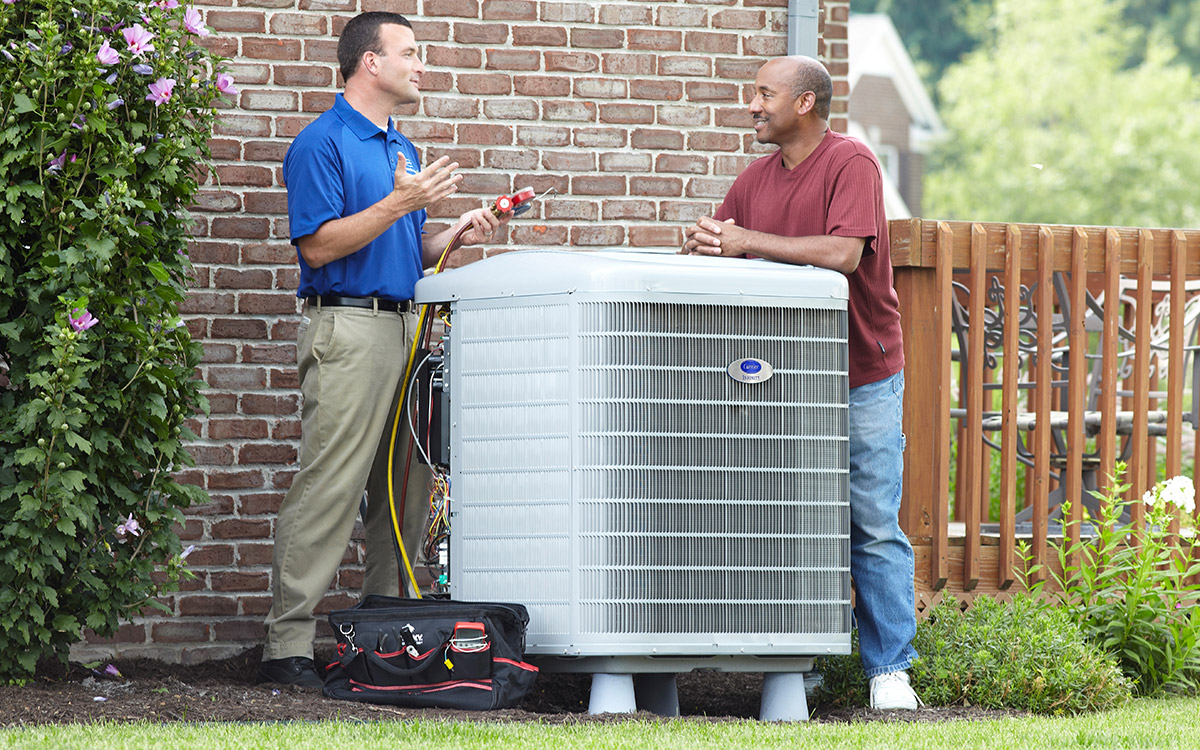
As global temperatures continue to rise, the demand for effective cooling solutions is higher than ever.
For both homeowners and businesses, air conditioning has become a necessity. However, with the growing focus on sustainability and energy conservation, the importance of energy-efficient air conditioning systems has never been more evident. Not only do these systems help reduce environmental impact, but they also lower energy costs.
Let’s explore the future of sustainable air conditioning and highlight the technologies driving these advancements.
The Importance of Energy-Efficient Air Conditioning
When we talk about energy efficiency in air conditioning, we’re referring to the ability of an air conditioning system to cool effectively while consuming the least amount of energy possible. Energy-efficient systems are designed to reduce the environmental impact associated with cooling by using less power to produce the same results.
Traditional air conditioners, while effective, are notorious for their high energy consumption. In fact, air conditioners account for nearly 6% of all electricity use in the U.S., making them one of the largest energy consumers. This high energy use translates into increased carbon emissions, contributing to global warming and climate change.
Energy-efficient systems, on the other hand, help mitigate these effects by using advanced technologies that reduce electricity consumption. By upgrading to a more sustainable air conditioning system, homeowners and businesses can contribute to a greener environment while cutting down on their monthly utility bills.
Key Technologies Driving Sustainable Cooling Solutions
The cooling industry has made significant strides in recent years, introducing innovative technologies that enhance energy efficiency. Let’s take a look at some of the latest advancements.
1. Inverter Technology
One of the key innovations in energy-efficient air conditioning is inverter technology. Inverter-driven air conditioners use variable-speed compressors that adjust cooling power based on the desired temperature. Unlike traditional systems, which turn on and off at full capacity, inverter systems can operate at varying speeds, allowing them to cool more efficiently while consuming less energy. This technology ensures that the system only uses the amount of power required to maintain a comfortable temperature, reducing energy waste.
2. Smart Thermostats and AI-Powered Systems
Smart thermostats are another game-changer in the world of sustainable air conditioning. These devices learn your cooling patterns and preferences, optimizing energy usage by adjusting settings based on your habits. AI-powered systems can predict when cooling is needed and when it’s not, ensuring that the air conditioner isn’t working harder than necessary. With these systems, users have more control over their energy consumption, leading to lower bills and a smaller carbon footprint.
3. Solar-Powered Air Conditioners
Solar-powered air conditioners take sustainability to the next level by harnessing the sun’s energy to power the cooling system. These systems use photovoltaic (PV) panels to generate electricity, which is then used to run the air conditioner. Not only does this reduce the reliance on grid electricity, but it also takes advantage of a renewable energy source, significantly lowering the environmental impact of air conditioning.
Benefits of Energy-Efficient Air Conditioning
Switching to an energy-efficient air conditioner offers numerous advantages beyond environmental benefits. Let’s dive into some of the key perks.
1. Lower Energy Bills
One of the most immediate benefits of installing a sustainable AC system is the potential savings on energy bills. By consuming less power, these systems help reduce monthly utility costs, which can add up over time, especially during the hotter months when air conditioning is in heavy use.
2. Reduced Carbon Footprint
By using less electricity, energy-efficient air conditioners contribute to a reduction in carbon emissions. This is a critical step in the fight against climate change, as reducing energy consumption helps lower the demand for fossil fuels and decreases overall greenhouse gas emissions.
3. Government Rebates and Incentives
Many governments offer rebates and incentives to encourage the adoption of energy-efficient systems. Homeowners and businesses that upgrade to eco-friendly air conditioning units may be eligible for financial assistance, making it easier to make the switch. These programs help offset the initial installation costs and make sustainable air conditioning more accessible.
4. Increased Lifespan and Reliability
Modern, energy-efficient air conditioners are designed with longevity in mind. By using advanced technologies that prevent overworking, these units tend to last longer and require fewer repairs, saving you money on maintenance in the long run. Also, they are built with reliability in mind, ensuring that you won’t have to worry about frequent breakdowns.
The Role of Sustainable Materials and Design in Air Conditioning
Energy-efficient air conditioners aren’t just about the technology inside the system; sustainable design and materials also play a crucial role in enhancing efficiency.
1. Eco-Friendly Refrigerants
Traditional refrigerants, such as R-22, are harmful to the environment because they contribute to ozone depletion. Newer systems use eco-friendly refrigerants like R-32, which have lower ozone depletion potential and a much smaller carbon footprint. This change is crucial for making air conditioning more sustainable in the long term.
2. Focus on Energy-Efficient Designs
The design of modern air conditioners focuses on maximizing airflow while minimizing energy use. Improved designs ensure that units are more efficient at transferring heat, reducing the amount of energy needed to cool a space. Proper insulation and sealing also play a role in reducing energy waste as they help maintain the desired temperature inside the building.
The Future of Air Conditioning: What’s on the Horizon?
As the demand for sustainable solutions continues to grow, new technologies and trends are emerging to further improve energy efficiency in air conditioning.
1. Emerging Technologies
Thermoelectric cooling and magnetic refrigeration are among the most exciting developments in the air conditioning industry. These technologies offer alternative methods for cooling that use minimal energy and have the potential to replace traditional refrigerant-based systems in the future.
2. Green Building Standards
Green building standards, such as LEED (Leadership in Energy and Environmental Design), are gaining popularity, and they’re shaping the future of air conditioning design. These standards prioritize energy-efficient systems that align with sustainability goals, and air conditioning is no exception. Buildings that are designed with these standards in mind will continue to rely on sustainable AC solutions.
3. Consumer Trends
Consumers are increasingly prioritizing sustainability when making purchasing decisions, including when it comes to cooling their homes and businesses. As awareness about climate change and energy consumption grows, more people are turning to eco-friendly air conditioning options that align with their values.
How to Choose the Right Energy-Efficient Air Conditioning System
When selecting an energy-efficient air conditioner, there are several factors to consider.
First, ensure that the unit is appropriately sized for your space. An air conditioner that is too large or too small for the area it’s cooling will waste energy. Look for the SEER (Seasonal Energy Efficiency Ratio) rating, which measures the unit’s cooling efficiency over a year. The higher the SEER rating, the more energy-efficient the system is.
Also, many modern air conditioners come with smart features that allow for better control over energy usage. Consider systems with AI-powered thermostats, which adjust cooling based on usage patterns.
To maintain your energy-efficient air conditioner’s performance, regular cleaning and servicing are essential. Proper installation and routine maintenance ensure that your unit runs at peak efficiency for years to come.
Frequently Asked Questions
Below are some commonly asked questions to consider:
1. How do I know if my current air conditioner is energy-efficient?
Check the SEER rating of your current system. If it’s below 14, it may be time to consider upgrading to a more efficient unit.
2. Are solar-powered air conditioners effective in all climates?
While solar-powered air conditioners are most effective in sunny climates, they can still provide energy savings in areas with moderate sunlight.
3. Can energy-efficient air conditioners really lower my energy bills?
Yes, by consuming less energy to cool your home, energy-efficient air conditioners can significantly lower your monthly utility bills.
The Future is Sustainable Air Conditioning
Sustainable air conditioning is no longer a luxury; it’s a necessity. With advancements in energy-efficient technologies, the future of cooling solutions is brighter than ever. By upgrading to sustainable air conditioning, you can reduce energy costs, minimize your carbon footprint, and contribute to a greener planet.
If you’re ready to switch to an energy-efficient air conditioning system, get in touch with professional air conditioner installation services today. They can help you select the best system for your needs and ensure a seamless installation process.

